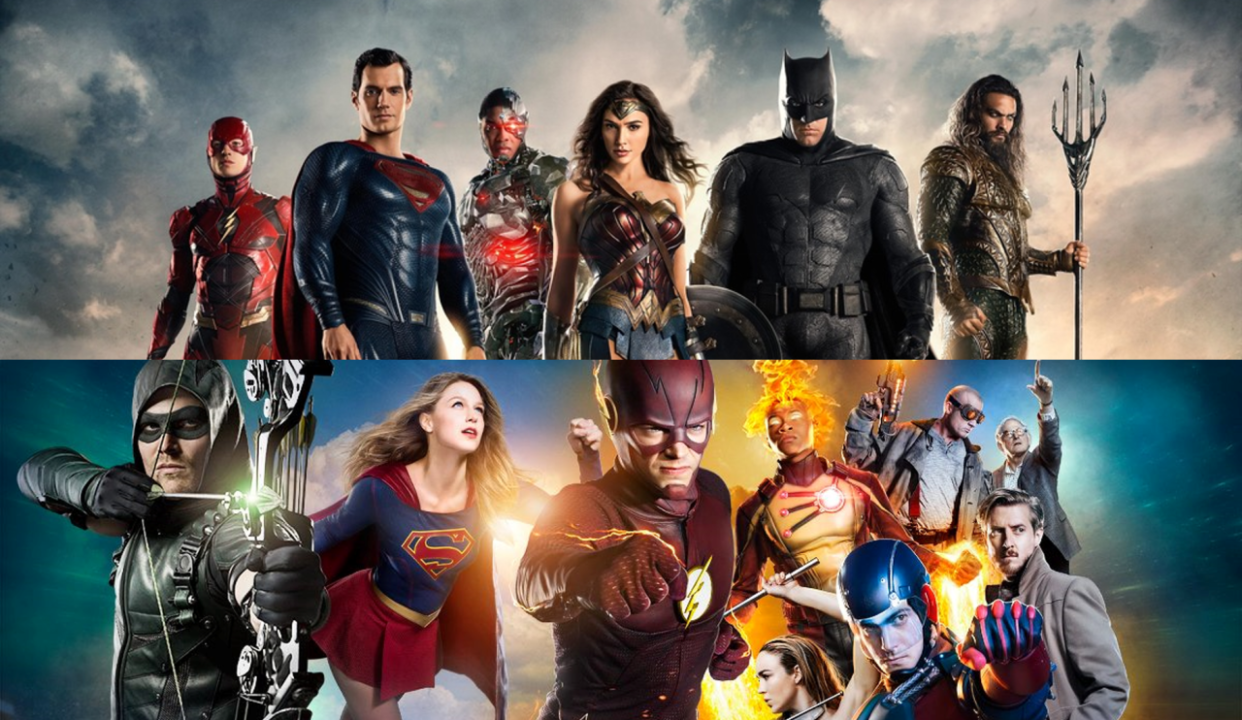Why DC is right to keep their TV and Movie Universes separate


It’s been an exciting few days for DC fans, with the company releasing trailers for their highly anticipated upcoming movies Wonder Woman and Justice League, as well as their popular television programs The Flash, Legends of Tomorrow and Vixen, and Arrow. (Unfortunately, there was no trailer for the wonderful Supergirl, which has found a new home on the CW after an excellent first season at CBS, but I’ve no doubt we’ll start to see some material from that show soon.) Generally speaking, these have all been received well, drumming up an even greater level of suspense in both dedicated fans and the wider public.
However, there have still been a few voices expressing a degree of disappointment, positing that this would have been better had the DC movies and the DC television series been unified; that the story we see on Arrow and suchlike would follow the story we see in movies such as Man of Steel, Batman vs Superman, and the upcoming Suicide Squad movie. It’s a model that Marvel employs, with their Avengers movies being set in the same universe as their Netflix programmes such as Daredevil or Jessica Jones; it’s in part because of this that people would like DC to have followed the same model.
These people are, however, incorrect – DC is entirely right to keep their TV and Movie Universes separate. Allow me to explain why.
Most immediately, there’s the matter of granting the programmes (because movies would undoubtedly take precedence) a level of freedom to chart their own path. The DC movie universe has, rightly or wrongly, thus far opted for a much darker interpretation of their iconic heroes; one that’s entirely valid, of course, but one that’s also worlds away from the lighthearted, even campy, tone of programs like The Flash or Legends of Tomorrow. Keeping the universes separate allows for both the movies and the television shows to have a greater level of control over their own direction and progress. Indeed, this was the same logic behind the choice when Zack Snyder committed to not using Grant Gustin’s Flash in the Justice League movie:
Even then, we’ve seen what can happen when a television show is left entirely beholden to the creative decisions of a larger beast – back with Agents of SHIELD season one. As much as I’ve grown to love Agents of SHIELD, the early days of the programme were rough. At the time I was quite harsh on it – in hindsight, there’s plenty of entertaining material in those early episodes – and so were many others; the current consensus is that the show didn’t quite work until its tie-in with The Winter Soldier, Marvel Studios’ 2014 Captain America movie. It was a movie that saw the disintegration of SHIELD entirely – something which had a significant impact on Agents of SHIELD, as you can probably imagine. Each episode had been written with the knowledge that this twist was coming, and the intention to establish a “normal” before the twist came, but it had the unintended consequence of severely limiting just what the show could do for itself on its own terms. While it all worked out well enough in the end, is that really something we’d want to happen on The Flash?
Of course, it’s hardly feasible for this to happen anyway, when considering the simple practicalities of television production in comparison to film production. The Flash films an episode a week, give or take, and does so for the majority of the year – still working on episodes while the season is being aired – releasing 23 episodes a year. Conversely, with the Justice League movie set to feature Ezra Miller as the Flash, principal photography began in April of this year; the movie isn’t scheduled to release until 2017. The sheer logistics of getting the television programme to match the movie – not just in terms of production schedules, but also in terms of how much content is released – are ultimately largely unfeasible. In essence, then, to have Grant Gustin’s Barry Allen in the Justice League would be to lose him on television – who on earth would want that?
Ultimately, the choice to keep the television and movie universes is the correct one for DC. Not only is it, frankly, the simpler and easier choice, it allows for greater creative expression, and more variety in their productions.
It also means we get a far greater amount of content, for what it’s worth. And it’s always pretty cool to have more superheroes, isn’t it?
Related:
SDCC News Roundup: Marvel Television
Like this article? Hate this article? Why not follow me on twitter for more, or send me a message on facebook to tell me what you thought? You can also find more of my articles for Yahoo here, or check out my blog here.



